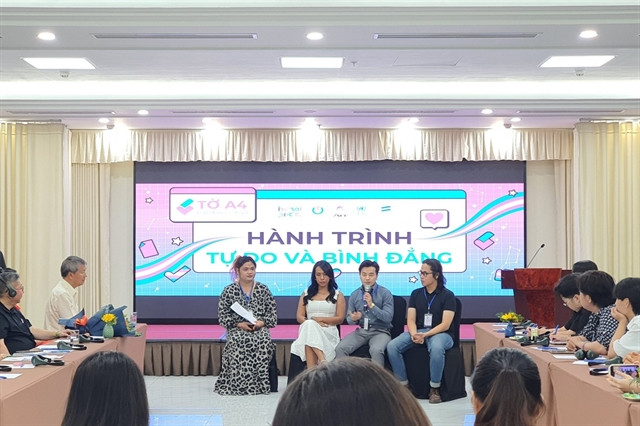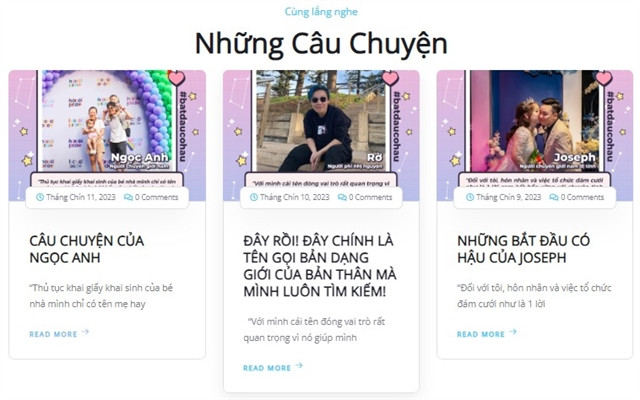 |
|
"Tờ A4" campaign team shares the results of their work at an event on Friday as part of the larger Free & Equal Campaign by the United Nations. |
Nearly ten years after transgender people were recognised in the Civil Code, numerous administrative obstacles are still present for this community which hopes that its future will look different as the development of a Law on Gender Affirmation is underway.
An event was held on Friday to look back at the results of a campaign advocating for transgender rights through discussions and stories told by the transgender community themselves.
The central theme of these 33 stories is about growing up, gender identity, coming out to their families and even the violence they experience in school, said Tilo, one of the campaign team members.
National Assembly (NA) deputy Nguyễn Anh Trí, who is leading the law project on gender affirmation, told the event that laws need to be based on reality, and in order to do so, the legislative process should take into account the community’s needs, opinions and experiences.
Chu Thanh Hà, founder of It’s T Time, an independent support organisation exclusively for transgender persons within Việt Nam, said: “Transgender people are still facing obstacles due to being unable to change their name and gender on their ID card or passport and other personal documents, including birth certificates and work contracts.
“These become obstacles as they try to access healthcare, educational and legal services, while also affecting their legitimate rights, in addition to employment and promotion opportunities as well as other benefits,” Hà said.
Taking inspiration from these documents, the "Tờ A4" (A4 sheets) campaign was created as a collaboration between the United Nations (UN) in Việt Nam and It’s T Time, looking to shift the administrative hurdles into positive beginnings for transgender people.
Addressing the event, UN Representative to Việt Nam Pauline Tamesis said about the campaign: “Reading through the stories gives us only the surface of the reality. I hope that with this dialogue, we can dig deeper into what this reality means in the legislative frameworks - the architecture that allows the LGBTQI community members to live the life they imagine for themselves.”
 |
| A section for the Tờ A4 campaign on It's T Time's website, where the Vietnamese transgender community share their stories. — VNS Screenshot |
Lawyer Đinh Hồng Hạnh said that there had been a change in concerns for the LGBTQ+ community since 2015, when transgender people were recognised in the law.
While most of the questions she received pre-2015 were about legal name change, response to school bullying and discrimination in employment opportunities, there are now more concerns about civil rights related to marriage and having children from the community.
While acknowledging that he had a relatively smooth journey as a transgender man, Phương experienced these legal obstacles first-hand as he and his wife Hương decided to have children in 2021.
“My two children now only have their mother’s name on their birth certificates, the father’s name was left blank,” said Phương.
He was also not legally able to sign papers when the C-section was ordered or when the family took the children home from the hospital, and had to ask Hương’s father to help complete the administrative procedures.
NA deputy Trí said: “The transgender community does exist and they are not 'sick' or going after any 'trends'. We have to understand them, share their burdens and do what it takes to ensure them an equal life in civil society.”
Noting how the draft gender affirmation law mentioned gender-diverse and non-binary people, Hà from It’s T Time said it would be a gesture of respect towards this community and care about them and their rights as humans.
“It also paves the way for Việt Nam’s general public to learn more about a topic which, in my opinion, is relatively new to them,” he added.
“There have been many seminars organised to listen to the [transgender] community’s opinions. We also conducted multiple surveys in which we try to approach the most diverse profiles in the community as we can,” said Hà.
Results from these events and surveys will be compiled and sent to the drafting committee of the gender affirmation law.
The draft is expected to be submitted to the NA for review in October 2024 and for approval in May 2025. — VNS